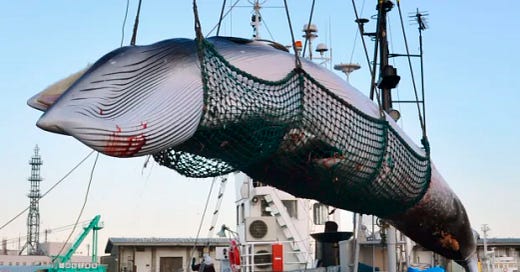The newly elected Icelandic government has released its parliamentary agenda, covering over a hundred issues. But missing from that list? Whales. Whaling. The ongoing slaughter in Iceland’s waters.
Is this another round of “strategic silence”? Another attempt to ignore the problem until it’s too late to act? Another excuse to blame past administrations instead of making the necessary changes today? Or is this just history repeating itself—a government content to delay, to stall, to sidestep responsibility until the next minister takes office?
Iceland’s troubled history with whaling
For decades, Iceland has been one of the few nations in the world that still allows commercial whaling, alongside Japan and Norway. While most countries have abandoned the practice, Icelandic whalers have continued to hunt endangered fin whales and minke whales, despite mounting international criticism.
Iceland initially left the International Whaling Commission (IWC)1 in 1992 over its anti-whaling policies but rejoined in 2002 with a controversial “reservation” that allowed the country to resume commercial whaling in defiance of the IWC’s global moratorium. Since then, Iceland has killed hundreds of whales, with most of the whale meat exported to Japan.
Public opinion in Iceland has shifted dramatically over the years. Recent polls indicate that a majority of Icelanders now oppose whaling, recognizing it as cruel, unnecessary, and damaging to the country’s international reputation. The tourism industry, one of Iceland’s largest economic drivers, has also voiced strong opposition, as whale watching has become far more profitable than whaling itself. A live whale is always much more profitable than a dead one.
A government that refuses to act
Despite the changing tides of public opinion, the Icelandic government has been reluctant to ban whaling outright. The previous administration introduced temporary suspensions and stricter regulations, citing ethical concerns and declining demand for whale meat. Yet, instead of taking decisive action to end whaling once and for all, the government has repeatedly chosen to extend hunting permits, allowing the industry to limp along year after year.
Now, the newly elected government has the power to change this. But instead of addressing the issue, they have chosen silence.
The cost of inaction
The world has lost 73% of its biodiversity. Scientists have warned us, again and again, that we are teetering on the edge of an irreversible tipping point. Yet instead of decisive action, Iceland’s government clings to outdated legislation, laws written 75 years ago, in a time when we lacked today’s knowledge, a time when many of the environmental crises we now face were being set in motion.
Iceland’s own Ethical Review Committee for Animal Welfare has confirmed what we already know: whaling is inhumane. The global scientific community has stated unequivocally that it threatens life on this planet. And yet, the government’s response? Silence.
If revoking a permit that enables cruelty is considered legally questionable, what does that say about our laws?
Laws exist to protect life. How have we reached a point where saving a species is a legal dilemma, while its destruction is shielded by legislation? How much more must we lose to satisfy the interests of a few?
During my time in Iceland, I have come to admire the fierce independence of its people. But I cannot reconcile that spirit with the reality that a handful of individuals—whose conflicts of interest and links to corruption have been exposed time and again—continue to hold the power to dictate the future of this country and generations to come.
The people of Iceland have spoken. They have signed petitions, participated in surveys, made their opposition clear. The majority wants whaling to end.
What they do not deserve is silence. They need us to add our voices to their fight!
- This ‘Sea Story’ is based on Anahita Sahar Babaei’s article. She is an Icelandic artist and activist.
The International Whaling Commission (IWC) is the global organization that regulates whaling and protects whale populations. It was created in 1946 to manage whaling, but over time, it shifted toward conservation. In 1982, the IWC banned commercial whaling, though some countries—like Iceland, Norway, and Japan—continue whaling through legal loopholes or by ignoring the ban.








